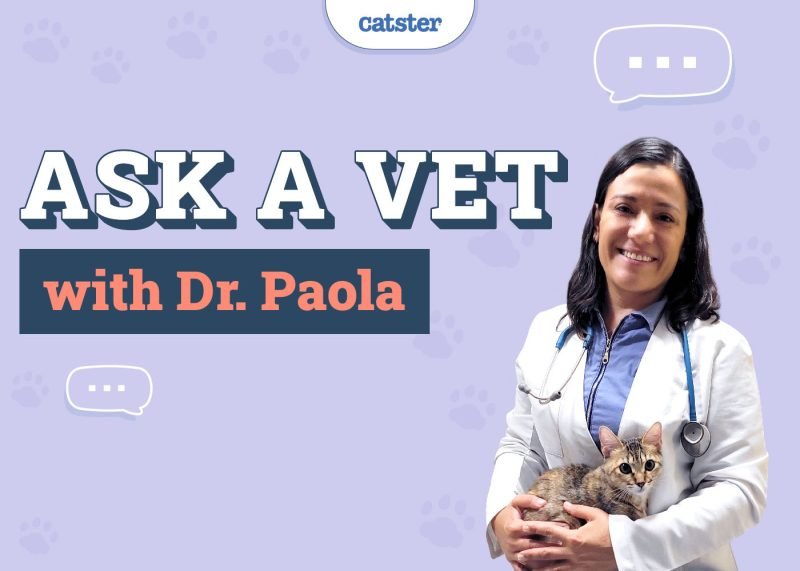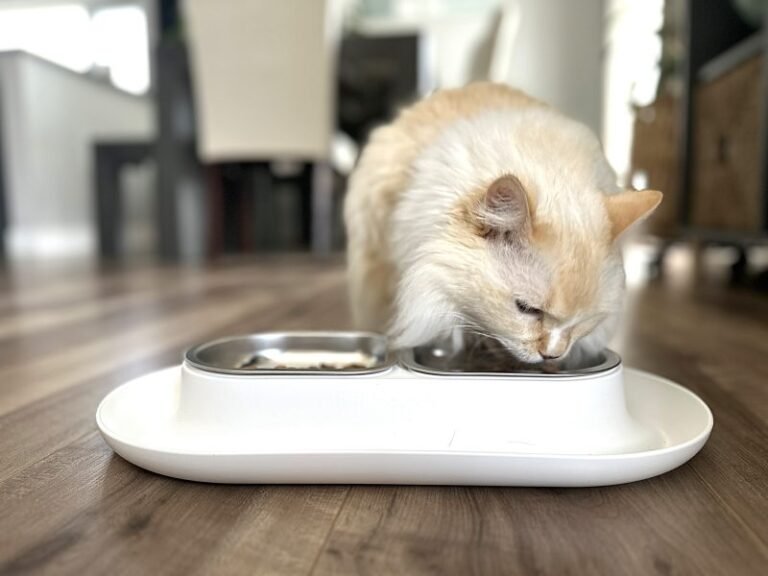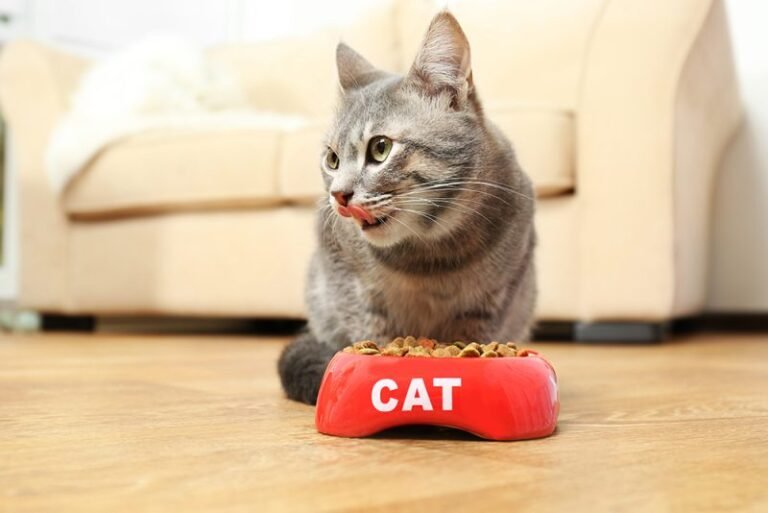

Welcome to our “Ask Dr. Paola” series, where every Monday we bring expert advice straight from Dr. Paola Cuevas (MVZ) to help our readers better understand their cat’s health and well-being.
Whether you’re a new pet parent or a seasoned cat lover, Dr. Paola is here to provide answers to your most pressing questions. From nutrition tips and preventive care to troubleshooting common behavioral issues, Dr. Paola is ready to offer insights that will keep your kitty happy, healthy, and feline fine. Stay tuned for expert guidance on a range of topics that matter most to you and your cat, so you can make informed decisions and provide the best possible care for your furry companion.
Have a question? Send it in here!

Help! My Cat Stares at Me While Using His Litterbox!
“Dear Dr. Paola,
Whenever my cat Plumpers uses the litter box, he stares directly at me. Is that a sign of something, or just him being weird? Should I do anything about it? “– Vicky
Hi Vicky,
Thanks for the lovely question. While Plumpers’ intense litter box stare might feel a bit odd, it’s actually a fairly common feline behavior and, in most cases, nothing to worry about. Cats are both predators and prey by nature, so they tend to be more vigilant in situations where they feel vulnerable, like when they’re using the litter box. By staring at you, Plumpers may simply be seeking reassurance or ensuring that you’re nearby to keep watch while he’s in a compromising position. It’s a bit like a child calling out for a parent while they’re in the bathroom, wanting to feel safe and supported.
That said, if you’ve noticed any changes in his litter box habits, such as straining, vocalizing, frequent trips, or avoiding the box, then his stare could be paired with discomfort or concern. In those cases, it would be wise to schedule a veterinary exam to rule out conditions like urinary tract inflammation or constipation, which are fairly common in cats. But if Plumpers seems otherwise happy, healthy, and uses the box regularly with normal posture and output, his behavior is most likely just his own special way of expressing trust. So, as long as it’s only the staring, embrace the weirdness!
Best,
– Dr. Paola

If you’d like to talk with a vet, like Dr. Paola or one of our other expert veterinarians, you can head over to PangoVet. It’s our online service where you can talk with a vet online and get the advice you need for your cat — all at an affordable price!
Catster reader exclusive deal: Save 65% on your first call, use code ASKDRPCATSTER65 at checkout.


Help! My Cat is Coughing!
“My healthy 16-year-old cat, Jake, recently started coughing like he’s going to cough
up a hairball, but then he doesn’t. Even in a dead sleep, he’ll jump up and crouch down
on all fours for several seconds. Then it’s over. Does this sound serious? I have 5 cats, but have never experienced this before.“ – Cheryl
Hi Cheryl,
At 16 years old, even subtle changes like this deserve attention. A dry, unproductive cough, especially if it’s frequent, wakes him from sleep, or happens while crouched with neck extended, may suggest irritation or inflammation in his airways rather than a simple hairball. In senior cats, this can sometimes point to conditions like feline asthma, chronic bronchitis, or even early signs of heart disease, particularly if the episodes are becoming more frequent or intense.
What you’re describing does sound like more than a typical grooming-related cough. Since he’s otherwise healthy and this is new behavior, I recommend scheduling a veterinary exam where a thorough physical can be done, potentially along with chest radiographs or airway evaluation. These tools help rule out more serious causes and ensure Jake gets the support he may need. Acting early often prevents medical complications. Please stay vigilant; if the coughing becomes more frequent or if you notice any labored breathing, open-mouth breathing, or lethargy, those would all be considered more urgent signs.
I hope this helps!
– Dr. Paola

I Want to Deworm a Feral Cat!
“Hello Dr. Paola,
I have been feeding a feral cat named Hank since winter, but now he is not thriving! I’d like to deworm him, but am confused about which type of worms to treat him for. The local co-op has products, but I am unsure which worm treatment I need.
This feral cat is friendly with me, unless a loud noise, high wind or another person’s voice startles him and he runs away. I can’t afford a vet visit; I feed and house an outdoor female (fixed) feral cat, and have my own 7-year-old rescue, a tabby that lives indoors.
I’m on a fixed income. I’ve rescued and rehomed many in this area, but at 71 years old., I will have to step away in the future. Hank can stay here permanently if he chooses to. I hope to SAVE him. Hoping deworming might help him. He is a bit independent and doesn’t stay overnight, but is otherwise homeless.” – Pat
Dear Pat,
Thank you for the deep compassion and dedication you’ve shown to Hank and the many cats you’ve helped over the years. It’s incredibly moving to see someone offer so much care, especially when resources are limited. For situations like Hank’s, where a feral or semi-feral cat isn’t thriving despite food and shelter, one of the most helpful first steps is reaching out to local animal control, municipal shelters, or rescue organizations. Many of these groups work closely with veterinarians and may offer low-cost or even no-cost veterinary services, including deworming, for community cats. They often have access to medications and diagnostics that individual caregivers can’t easily obtain on their own, and some may even offer mobile clinics or trap, neuter, return (TNR) support, which can include basic medical care.
If those services aren’t accessible in your area or they’re at capacity, then starting with an over-the-counter (OTC) dewormer is a practical and reasonable approach. Since a fecal test isn’t possible and Hank’s outdoor lifestyle likely exposes him to various parasites, choosing a broad-spectrum product made specifically for cats is important. Pyrantel pamoate, sold under brand names like “Nemex-2” or in generic form, is safe and effective for treating roundworms and hookworms. It’s available in liquid form and is generally well-tolerated. If Hank has had fleas or hunts small prey, adding a praziquantel product such as the “Tapeworm Tabs for Cats” by Elanco will help address common tapeworms. Just be sure to avoid any dewormers labeled for dogs, like “PetArmor 7 Way De-Wormer,” which can be dangerous for cats even if the ingredients sound similar. Likewise, it’s important to ensure the dose is appropriate for his weight.
If Hank still doesn’t seem to improve after a course of deworming, or if he remains underweight, has a dull coat, or shows signs of digestive upset, it may be time to consider other possible causes, like chronic infections or nutritional deficiencies. But even this first step of parasite control can make a meaningful difference. You’ve already changed his life simply by caring, feeding, and sheltering him, and that kind of steady support truly lays the foundation for recovery. Again, thanks for your compassion; our planet needs lots of it.
Sincerely,
Dr. Paola
- Read last weeks questions here – June 30, 2025
- Find the full list of past articles here
- Click here to submit a question
The post Ask Dr. Paola – Staring, Coughing & Deworming (July 7, 2025) by Dr. Paola Cuevas MVZ (Veterinarian) appeared first on Catster. Copying over entire articles infringes on copyright laws. You may not be aware of it, but all of these articles were assigned, contracted and paid for, so they aren’t considered public domain. However, we appreciate that you like the article and would love it if you continued sharing just the first paragraph of an article, then linking out to the rest of the piece on Catster.com.


